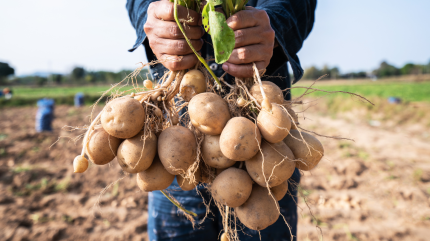

PepsiCo has joined forces with fertiliser supplier Yara International to secure lower-emission crop nutrients for its European business.
Yara will deliver up to 165,000 tonnes of fertiliser per year to the Lay’s crisps maker, covering around 25% of their crop fertiliser needs in Europe by 2030, according to a statement today (16 July).
The global crop nutrition company will supply PepsiCo with “low-carbon footprint fertilisers produced from either renewable ammonia” or “low-carbon ammonia via carbon capture and storage (CCS)”.
The fertiliser will come from both Yara’s new renewable hydrogen plant in Norway and another in the Netherlands.
The partnership will include approximately 1,000 farms, covering a total of around 128,000 hectares across the EU and the UK. Efforts will initially focus on potatoes and then expand to other crops such as oats and corn.
Fertilisers currently account for around half of PepsiCo’s average potato carbon footprint in Europe, it said.
Access the most comprehensive Company Profiles
on the market, powered by GlobalData. Save hours of research. Gain competitive edge.

Company Profile – free
sample
Your download email will arrive shortly
We are confident about the
unique
quality of our Company Profiles. However, we want you to make the most
beneficial
decision for your business, so we offer a free sample that you can download by
submitting the below form
By GlobalData
“This partnership with Yara aligns with our end-to-end transformation known as PepsiCo Positive (pep+) and will be critical as we transition towards the net-zero food system of the future,” said Archana Jagannathan, chief sustainability officer at PepsiCo Europe.
Addressing Scope 3 emissions can be “one of the most challenging areas to directly influence”, she said.
Jagannathan added: “Providing our farmers with fertilisers that have a lower carbon footprint and supporting them to improve crop nutrition end-to-end will allow us to make a significant step towards our target of achieving net zero by 2040.”
PepsiCo has set itself a target of “regenerative agriculture practices” being used on seven million acres of land used “to grow our crops and ingredients for our products” by 2030.
In 2023, more than 1.8 million acres were using the practices, up from more than 900,000 in 2022.
Meanwhile, by 2030, the Lay’s maker wants to “sustainably source 100% of our key ingredients”, a list that will include not just the potatoes, corn and oats used for the company’s snacks and cereal “but also key crops from third parties, such as vegetable oils and grains”. In 2023, the proportion of ingredients meeting that benchmark stood at around 58%, PepsiCo said, up from 55% a year earlier.
“To grow a nature-positive food future and transform our food system, we need to collaborate across the food value chain,” said Mónica Andrés Enríquez, executive vice president for Europe at Yara.
“Decarbonising food production will be critical to delivering on the Paris Agreement – and farmers will play a key role in helping us get there.”
In 2022, PepsiCo and Yara, among other major food players, published an “action plan” to “scale up” the use of regenerative agriculture.
The adoption of regenerative agriculture was proving “too slow” with the “economics” for farmers unworkable, the group of agri and packaged food majors said.

